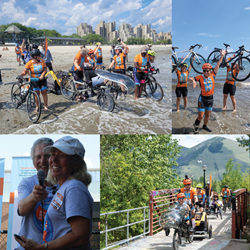
Stroke Across America in Missoula, Montana and Revere, Massachusetts
“Seeing the incredible resilience of people impacted by stroke, and the commitment of those who support them, was truly inspiring. Our events were a highlight of the trip–they reinforced how important it is not to let yourself get isolated after a stroke or when living with aphasia.” -Debra Meyerson
PORTOLA VALLEY, Calif. (PRWEB)
November 17, 2022
On May 19, a team of cyclists representing Stroke Onward set out on an epic journey across the United States. Known as Stroke Across America, the goal was to ride across the country and, during the 100-day journey, raise awareness about stroke, aphasia, and the emotional wellness journey that is critical, and often overlooked, in recovery. On August 26th, 4,548 miles later, they arrived in Boston and dipped their front tires in the Atlantic Ocean. Stroke Onward has just released a three-minute video highlighting the journey and is building on the awareness raised by this journey to continue its work to catalyze change in the stroke system of care to better meet the needs of survivors and their families. Lack of support for the emotional journey in recovery echoed time and time again at community events organized by Stroke Across America all across the country.
Debra Meyerson and Steven Zuckerman, wife and husband, stroke survivor and carepartner, and tandem riders – organized and led this journey. They are the co-founders of Stroke Onward, a nonprofit committed to ensuring stroke survivors and their supporters have the resources needed to rebuild identities and rewarding lives. Steve and Debra were inspired to create this trip as cycling has been instrumental in rebuilding their lives after a severe stroke in 2010 left Debra with aphasia and other disabilities. They were joined by Michael Obel-Omia, also a stroke survivor living with aphasia, and Whitney Hardy, who survived a near-fatal car accident and lives with disabilities from a traumatic brain injury.
Debra is a Stanford University professor (tenured before her stroke). Steve is a non-profit executive. They have ridden a tandem bicycle since shortly after Debra experienced a severe stroke in 2010, leaving her unable to ride on her own. This is just one way Debra’s stroke changed their lives forever, and a prime example of how they have worked hard to make sure the stroke doesn’t hold them back.
Connecting with Communities Across the Country
This team of inspiring individuals has shown that even with disabilities, one can live a full and fulfilling life. In order to advance the mission of Stroke Onward, the journey was specifically designed to create connections within and beyond the stroke community. The team hosted 16 community events in cities across the US that brought together more than 1,200 people: survivors, their loved ones, healthcare providers, cyclists, and the general public. They were organized in collaboration with more than 100 local organizations, mostly groups involved in stroke care and support. These events allowed the team and local participants to connect, share, and learn together.
“Seeing the incredible resilience of people impacted by stroke, and the commitment of those who support them, was truly inspiring,” shared Debra. “Our events were a highlight of the trip – they reinforced how important it is not to let yourself get isolated after a stroke or when living with aphasia, and that we must come together as a community to drive the healthcare system to better support the emotional journey in recovery after traumas like stroke.”
Building a Better System of Care
“Stroke is just not limited to a disease or the medications or therapies. It changes your life and you have to accept the changes in your life” – Dipika Aggerwal, MD, Neurologist and Stroke Survivor, speaking at the Kansas City Stroke Across America Event
Resounding feedback during Stroke Across America confirmed the critical importance of the emotional wellness journey in stroke recovery and the lack of resources to support it. After a traumatic, life changing event like stroke, one’s identity can be left shattered with few available resources to help rebuild it. Stroke Onward’s continuing goal after Stroke Across America is to be a catalyst for change in the stroke system of care – to improve how survivors and their families are supported in rebuilding identities and rewarding lives after stroke. Stroke Onward is organizing its efforts through a four-pronged strategy – raising awareness, creating and sharing resources, building communities, and driving institutional change. Current projects include partnering with academic institutions to integrate their content into healthcare provider degree program curriculum, and evaluating barriers and opportunities to bring more mental health professionals into the stroke system of care.
Stroke Onward invites everyone to continue to stay connected with us through our social media @strokeonward on Instagram, Facebook, Twitter, LinkedIn, and TikTok and our website http://www.strokeonward.org ; only together can we improve the stroke system of care.
CONTACT
Interview Requests: Flannery O’Neil, Executive Director, Cell: 602-317-8095, email: flannery@strokeonward.org
IMAGES
High Res Images and Video
SOCIALS
Instagram: @strokeonward | Twitter: @strokeonward | Facebook: @strokeonward | TikTok: @strokeonward
SHARE THIS STORY
Online version: https://strokeonward.org/press-room-saam/
STROKE ACROSS AMERICA IN THE PRESS – highlights
For links to more press coverage of Stroke Across America, click here.
Share article on social media or email:

